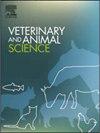补充白藜芦醇对泌乳早期热应激荷斯坦奶牛生产性能和代谢适应的影响
IF 1.9
Q2 AGRICULTURE, DAIRY & ANIMAL SCIENCE
引用次数: 0
摘要
本试验旨在研究添加白藜芦醇(RSV)对热应激泌乳早期奶牛生产性能和代谢反应的影响。18头奶牛(体重= 640.8±29.4 kg,胎次= 2.0,平均日产奶量= 44.4±2.0 kg,泌乳天数(DIM) = 39.8±6.5 d);平均±SD)的患者随机分为三个治疗组:(1)对照组(CON;(2) RSV-4(每天4 mg RSV/kg BW)或(3)RSV-8(每天8 mg RSV/kg BW)。结果表明,饲粮中添加RSV,特别是添加8 mg/kg时,显著提高了DMI和产奶量,分别提高了0.8 kg/d和2.9 kg/d (P <;0.05)。与CON组和RSV-4组相比,RSV-8治疗还显著降低了直肠和阴道温度(P <;0.01),而RSV-4组呼吸速率(RR)高于CON组和RSV-8组(P <;0.01)。此外,血清代谢参数显示,与CON组相比,补充RSV-8和RSV-4显著提高了血清天冬氨酸转氨酶活性和NEFA水平(P <;0.05)。两个水平的RSV补充导致血清胰岛素水平显著升高。抗氧化分析显示,补充RSV可提高血清丙二醛水平,尤其是RSV-4组(P <;0.05)。综上所述,饲粮中添加RSV可对热应激荷斯坦奶牛泌乳早期采食量和泌乳性能产生积极影响。本文章由计算机程序翻译,如有差异,请以英文原文为准。
Effects of resveratrol supplementation on performance and metabolic adaptations in heat-stressed Holstein cows during early lactation
This study investigated the effects of resveratrol (RSV) supplementation on performance and metabolic responses of heat-stressed, early lactation cows. Eighteen cows (BW = 640.8 ± 29.4 kg, parity = 2.0, average daily milk yield = 44.4 ± 2.0 kg and days in milk (DIM) = 39.8 ± 6.5 d; mean ± SD) were randomly assigned to one of three treatment groups: (1) control (CON; no RSV supplementation), (2) RSV-4 (4 mg RSV/kg BW per d) or (3) RSV-8 (8 mg RSV/kg BW per d). Results demonstrated that RSV supplementation, particularly at 8 mg/kg, significantly improved DMI and milk yield, with increases of 0.8 kg/d and 2.9 kg/d, respectively (P < 0.05). The RSV-8 treatment also significantly reduced rectal and vaginal temperatures compared to both the CON and RSV-4 groups (P < 0.01), while the RSV-4 treatment resulted in a higher respiratory rate (RR) than both the CON and RSV-8 groups (P < 0.01). In addition, serum metabolic parameters showed that RSV-8 and RSV-4 supplementation significantly increased serum aspartate aminotransferase activity and NEFA levels, respectively, compared to the CON group (P < 0.05). RSV supplementation at both levels led to a significant increase in serum insulin levels. Antioxidant analysis showed that RSV supplementation increased serum malondialdehyde levels, especially in the RSV-4 group (P < 0.05). In general, these results indicate that RSV supplementation can have a positive effect on feed intake and lactation performance in heat-stressed Holstein dairy cows in early lactation.
求助全文
通过发布文献求助,成功后即可免费获取论文全文。
去求助
来源期刊

Veterinary and Animal Science
Veterinary-Veterinary (all)
CiteScore
3.50
自引率
0.00%
发文量
43
审稿时长
47 days
 求助内容:
求助内容: 应助结果提醒方式:
应助结果提醒方式:


